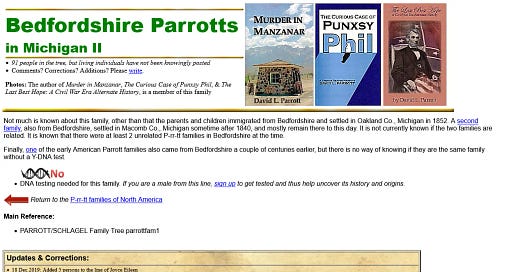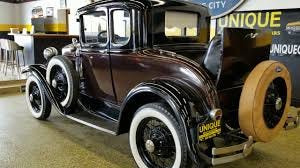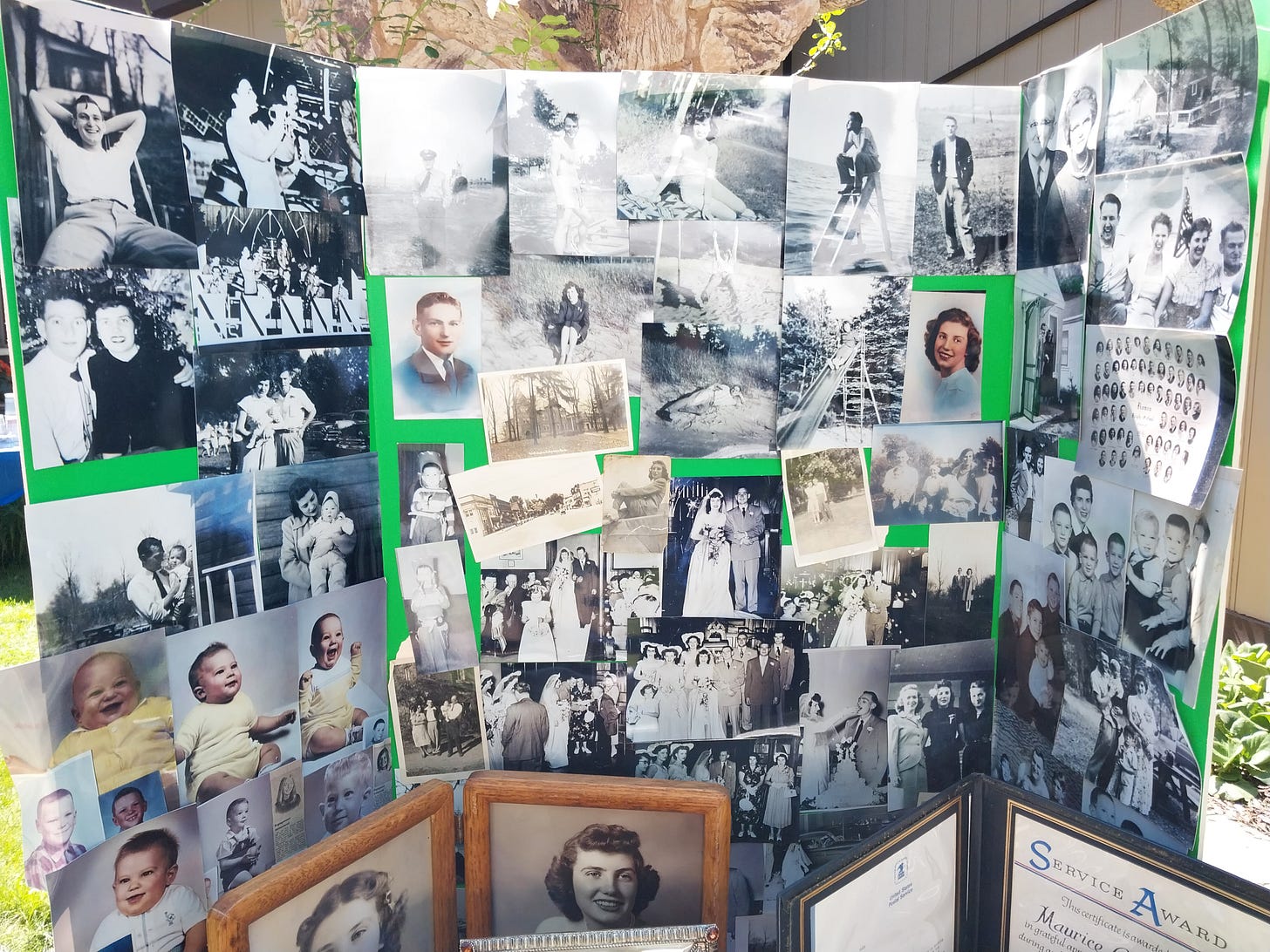Quite a few years ago, when my father was still alive (but undergoing cancer treatment) he asked me to come to his house and fix something. I think it was his riding lawnmower because he had me working in the garage under the house and he was sitting on the stairs watching. Out of nowhere, he said, “Now I know who you remind me of! …Uncle Walter! You love to tinker with machinery like Uncle Walter.”
I think I responded with some comment like “Uncle Who?” I had never heard of Uncle Walter, and I didn’t remember ever meeting him at any of the (very few) family reunions I had attended as a boy. He was one of The Michigan Parrotts that I never knew because we moved to Pennsylvania when I was three and we only rarely returned to Michigan to visit the extended family.
The Family Genealogy Rabbit Hole
The “Michigan Parrotts” are actually descendants of “The Bedfordshire Parrotts” - who are discussed on this British family genealogy page which can be found on the internet:
There were a couple of surprises on this page. The first surprise was that someone in charge of this web page found some of the books I’ve written and included photos of them(!) 1
Another surprise was more information about Abraham Parrott, who left Bedfordshire - with this note.
ABRAHAM PARROTT “Arrived 1852. Before that, was jailed in England in 1847 for night poaching.”2
And just above that there was the note: ”Step Mother Elizabeth Duncan. 1/2 Bro ´= Solomon, 22 May 1821 Bedfordshire - Oct. 1851 Bedfordshire. Jailed 1841 for arson.”
Just from reading this brief entry, it raises some interesting questions. There were two brothers, Abraham and his half-brother Solomon. Both were jailed for some unknown period of time - Solomon in 1841, and Abraham in 1847. Four years after that, Solomon dies at age 30, one year after that Abraham leaves The (Bedford)Shire and heads to America. I could digress here and talk about a genetic predisposition to larceny but that might have to wait for another day! Meanwhile, here is an image of our immigrant ancestor:

Uncle Walter’s Famous Model A Ford…
Last summer, I attended the memorial service for my Uncle Morrie and Aunt Fran. Uncle Morrie was my dad’s younger brother. I was talking to some of my cousins - including Uncle Morrie’s four sons (see images below) and my cousin Jeff Frost, who happened to know quite a bit about Uncle Walter. He mentioned something I had never known - that Uncle Walter was somewhat famous for purchasing a Model A Ford when they were new - which would have been at the beginning of The Great Depression(!) and driving it his entire, quite long, life.
Apparently, Uncle Walter maintained it meticulously and only used original Ford Motor Company parts. When he was quite a bit older, Jeff told me that Ford Motor Company had made him an interesting offer. He could go to any Ford dealer and pick out any vehicle he wanted and they would “trade him even up” for his antique Model A. He refused!
The image above is what I think would be a similar Model A Ford with a “Rumble Seat” which in this image is the seat open in the back right in front of the spare tire. My cousins told me that Uncle Walter was known for bringing baseball bats, balls, and gloves to family reunions so that the uncles and cousins could play ball. My sister Jayne mentioned that he would also bring a cooler of pop/sodas in the rumble seat and that she looked forward to his arrival for that reason!
My Parrott cousins at the funeral and memorial service for Uncle Morrie and Aunt Fran… on a typical Michigan summer day.
Some of the Michigan Parrotts…


My cousins confirmed the stories about Uncle Walter and his penchant for tinkering with machinery and the fact that he did all the maintenance of his vehicle himself - a family tradition which I have been carrying on…
A Tradition of Tinkering with Things.
The story of my dad saying “You remind me of Uncle Walter” brought to mind an earlier conversation - perhaps not quite as positive. I remember it was on my birthday (roughly age six) in the garage under our house in Pittsburgh, that my dad said to me, “You destroy everything I give you!” He had just given me a battery-powered toy train that made noise, lit up, and spun around on the floor. I found this fascinating so I tore it apart to see how it worked. Often, when I would do this I would fail to put the toy or object back together - hence his comment!

Move Slow? and Fix Things?
Last month I mentioned the book 4000 Weeks by Oliver Burkeman. In the chapter I have been reading this week he told a story about seeing a neighbor fixing his car, and saying to him, “I could never do that. I’m not handy.” His neighbor replied “That’s because you lack patience.”
Which has made me wonder, “Am I handy, or just stubbornly persistent?” I add the word “stubbornly” on purpose, because I am quite sure it is a trait I’ve inherited from my dad. I think it is not generally considered a compliment to call someone stubborn. We might have grudging admiration for them, but often such people are a pain in the neck!
I suppose there are people who are just naturally gifted at some skill or the other. They just have the knack of doing things well. I have met a few of them working in the construction trades. That sort of person could see something being done, almost immediately pick up how to do it, and in a short period of time not only do it as well as the person they learned from but be doing it better. A carpenter named Eric Davey that I knew had that “knack.”
Part of the approach to those of us who are “stubbornly persistent” (not gifted) is being interested enough or stubborn enough to continue at the task. Which brings me to…
Comparison to Writing…
How is Writing a Novel (or a newsletter!) like tearing the bed off a pickup truck and putting it back on? I remember a quote by Hemingway when he was responding to comments about the great writing style he had. His reply was “I struggle to put something into words - to try to somehow get people to understand my thoughts, and they call this “The Great Hemingway Style.”” 3
Another writer, Karl Ove Knåussgard, titled his six-volume autobiography about his writing life, Min Kamp - which is Norwegian for “My Struggle.”4 He talks about the decades-long struggle to write and get published and his persistence at that goal. I managed to read all six volumes which is a testament to my own stubborn persistence!
In summary, there is a song by one of Leslie and my favorite contemporary jazz singers, Michael Franks. The opening lyric is
“Some sprint to snatch the prize in. My goal’s the far horizon. I guess, I’m obsessed, with that long slow distance…”
Best wishes and happy holidays!
David
Notes and Footnotes:
*Note to readers - the title for this post was “borrowed” from an article with a similar name by Tish Harrison Warren that can be found here:
https://www.christianitytoday.com/2024/11/go-slow-and-repair-things- evangelicals-diverse-democracy/
*The title is also a play on Mark Zuckerberg’s company motto for Facebook/Meta - that saying is “Move Fast and Break Things” which was their approach to innovation.
Join me next month for a discussion of “Posthumous Fame” which I think this post naturally leads up to…
If I haven’t mentioned it yet, there is a story of my dad (with Bear Parrott riding shotgun) driving in the exit of the donut shop while he claimed “The exit sign at the donut shop is not legally binding, only put there by the shop owners, hence I consider it “merely a suggestion.”” Thus continuing a family tradition of flouting the law!
This is my paraphrase from memory. As with many stories about famous people, it could be entirely apocryphal.
The Min Kamp books
While Knausgård's two first books were well received, it was the six-volume Min Kamp series of autobiographical novels that made Knausgård a household name in Norway. Published from 2009 to 2011 and totalling over 3,500 pages, the books were hugely successful and also caused much controversy.[7][9] The controversy was caused partly because the Norwegian title of the book, Min Kamp, is the same as the Norwegian title of Hitler's Mein Kampf, and partly because some have suggested Knausgård goes too far in exposing the private lives of his friends and family—including his father, ex-wife, uncle, and grandmother. The books have nevertheless received almost universally favourable reviews, at least the first two volumes. In a country of five million people, the Min Kamp series has sold over 450,000 copies.[10]















